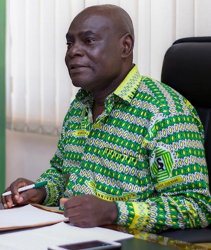The Executive Council of the Association of Rural Banks, Ghana, has registered its appreciation and commended all the rural banks which have so far supported government in the fight against spread of coronavirus.
The total amount involved in this support is approximately GH¢400,000 – which went into the purchase of Personal Protection Equipment (PPE).
Quite a number of health facilities and vulnerable institutions in almost all regions of the country have so far benefitted from this support. This is so because there are one hundred and forty-four rural banks in Ghana with approximately eight hundred branches – making it possible for a lot of the communities to be benefit from this support.
The items are mainly disposable gloves, nose masks, hospital mattresses and tissue paper. Other items include disposable masks, infrared thermometers, Veronica buckets with stands and hand sanitisers.
Business & Financial Times can confirm that about seventy percent of the rural banks in Ghana have donated various items to support the fight against COVID-19.
First to pave the way, being the pace-setter of the industry, was Atwima Kwanwoma Rural Bank in the Ashanti Region; followed by Amenfiman Rural Bank in the Wesern Region, South Akim in the Eastern Region, and Anlo Rural Bank in the Volta Region.
Others include Nsoatreman Rural Bank in the Bono Region; Gomoa Rural Bank in Central Region Agona Rural Bank in the Central Region; Lawra Area Rural Bank in the Upper West Region; Bosomtwe Rural Bank in the Ashanti RegionBESSFA Rural Bank in the Upper East Region; Awutu Emasa Rural Bank in the Central Region; Suma Rural Bank, Bono Region; and Sekyere Rural Bank in the Ashanti Region.
The rest are Yapra Rural Bank in the Bono East Region; Enyan Denkyira Rural Bank in the Central Region; Otuasekan Rural Bank in the Ashanti Region; Kaaseman Rural Bank in the Western North Region; Odotobri Rural Bank in Ashanti Region; Nkoranza Kwabre Rural Bank in the Bono East Region; Adansi Rural Bank in Ashanti Region; Amansie West Rural Bank in Ashanti; Nkoraman Rural Bank in the Bono Region; and Nandom Rural Bank in the Upper West Region.
The National President of the Association of Rural Banks, Ghana, Daniel Ohene Owusu, in an interview told Business & Financial Times that the pandemic – which has sent shivers down the spines of many across the world and claimed many lives – has equally affected economic activities in the operational territories of rural banks in Ghana, and there is a need to contribute in government’s efforts to curb or control spread of the virus.
Mr. Ohene Owusu believes the support will also help reinforce the message that the Health Ministry and World Health Organisation have been stressing, which is the importance of washing hands under running water as well as applying hand sanitisers among other precautionary measures.
“Rural Banks in Ghana believe in supporting the communities in which they operate through their corporate social responsibility activities, and we spend about GH¢2million annually with our community support in many ways. We have built educational facilities, provided potable water, offered scholarships to brilliant but needy pupils, provided security to the people by building a police station in the Ashanti Region, and offered employment to over one million indigenes in the communities where we operate – so we understand these things better,” he emphasised
By this, Mr. Ohene Owusu further appealed for government to be very considerate and flexible with their tax obligations, since rural banks’ survival in the rural areas will bring a lot of development to the communities in which they operate.
He thanked government through the Bank of Ghana for paying back a chunk of their investments which were locked up with financial institutions that were regulated by the BoG.
Mr. Ohene Owusu has however made a passionate appeal to government through the Securities and Exchange Commission that oversees the activities of fund managers to speed-up the process to pay back the investment of some rural banks which have been affected in the financial clean-up exercise, as this will beef-up their liquidity and eventually enhance their profitability to continue supporting their communities.










